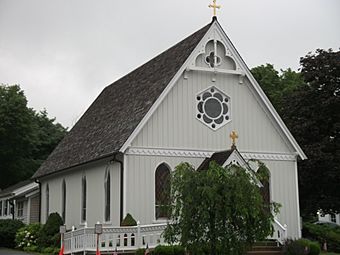Clinton Village Historic District (Clinton, Connecticut) facts for kids
Quick facts for kids |
|
|
Clinton Village Historic District
|
|
 |
|
| Location | Along Cemetery Rd., Church, E. Main and Liberty Sts., Old Post Rd. and Waterside Ln., Clinton, Connecticut |
|---|---|
| Area | 120 acres (49 ha) |
| Architectural style | Colonial, Federal, Greek Revival |
| NRHP reference No. | 94000788 |
| Added to NRHP | July 29, 1994 |
The Clinton Village Historic District is a special part of Clinton, Connecticut. It's like a time capsule showing how the town center looked long ago. This area stretches along East Main Street (also known as United States Route 1). You can find buildings here from the late 1600s all the way to the mid-1900s! In 1994, this historic district was added to the National Register of Historic Places. This means it's a very important place to protect.
Contents
Exploring Clinton's Past
The area we now call Clinton was first settled way back in 1663. Later, in 1838, it officially became its own town. Before that, it was part of a larger town called Killingworth.
Liberty Green: A Historic Park
One important spot is Liberty Green. This small, triangle-shaped park is where East Main and Liberty Streets meet. Long ago, it was the town's common area. It was also used as a training ground for the local militia.
Early Town Center
Near the western end of the district, on Church Street, you'll find the site of an early meeting house and cemetery. A meeting house was a building used for both church services and town meetings. This area was the main town center for Killingworth before Clinton became separate.
Growth of a Coastal Town
Clinton grew slowly as a small town by the coast. It helped local farmers and travelers passing through. The main road back then was the Boston Post Road, which is now US 1. In the 1840s, Liberty Green was turned into the park we see today.
A Step Back in Time
Later in the 1800s, the town's main business area moved west. This happened because the railroad station was built there. This shift helped keep the eastern part of the town looking much like it did in the mid-1800s. It's why the historic district feels like a trip back in time!
Buildings and Architecture
The Clinton Village Historic District has 154 important buildings and other features. Most of these are along East Main Street. Some also extend along Liberty Street to the north and Waterside Lane to the south.
Oldest Homes
The oldest house in the district is called The Arsenal. It's on Waterside Lane and is thought to have been built around 1675. Imagine living in a house that's almost 350 years old!
Popular Styles
Many houses in the village show the Greek Revival style. This style was popular in the 1830s and 1840s. You might see features like tall, flat columns (called pilasters) on the corners of buildings. Sometimes, these features were even added to older homes to update their look.
Important Historic Buildings
Here are some of the historic buildings you can find in the district:
- Clinton Volunteer Fire Department (built in 1931)
- The Academy (built in 1801), now used by the Clinton Parks and Recreation Department
- Town Hall
- First Church of Christ (built in 1837)
- Abraham Pierson Monument
 | Aaron Henry |
 | T. R. M. Howard |
 | Jesse Jackson |



